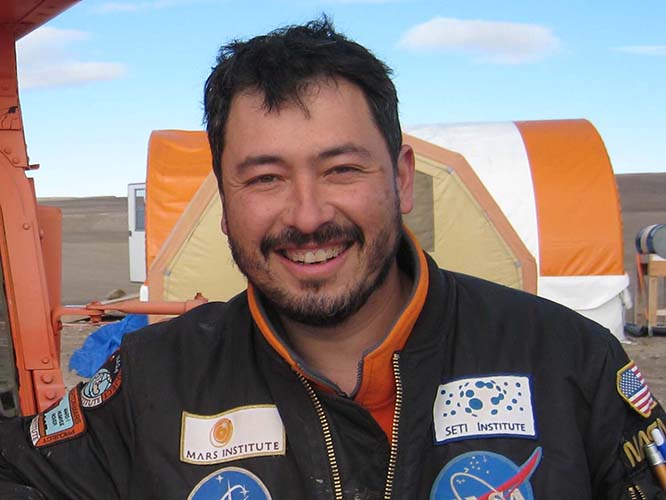Dr. Pascal Lee, a planetary scientist with the SETI Institute and NASA Ames, founder of the Mars Institute and a professor of planetary science at Kepler Space University, will speak at the National Space Society’s 2024 International Space Development Conference® (ISDC®), held from May 23-26, 2024, in Los Angeles, California.
Dr. Lee’s principal talk will focus on the recent discovery of a huge Martian volcano, the first new geological find of this magnitude since the other major volcanoes on Mars were discovered in the early 1970s. Lee and his research associate, Sourabh Shubham, who is a graduate student at the University of Maryland’s Department of Geology, spotted the volcano, provisionally called Noctis Mons, while researching what appears to be an ancient glacier near the Martian equator. “We were examining the geology of an area where we had found the remains of a glacier last year when we realized we were inside a huge and deeply eroded volcano,” Lee said.
Lee is also chairing the Mars session at ISDC on Saturday, May 25. A variety of prominent Mars scientists, engineers, NASA program leaders, and other Mars professionals will be speaking. The day begins with an overview of Mars exploration, then moves on to individual presentations, open forums, and a panel discussion.
“Each year, I live in anticipation of the next NSS ISDC meeting. It’s such a forward looking and fun conference, combining science, exploration, and boundless visions of our human future in space,” Lee said.
Lee has been researching geological features on Mars for decades, and as a part of his interest in human exploration of the planet, designed and built a Mars analog base in association with NASA which has been in operation since the late 1990s. Called the Haughton-Mars Project (HMP) Base, it is situated on Devon Island in the high Arctic. Experiments conducted there include Mars/Moon rover operations and exploration strategies; the testing of Mars/Moon EVA spacesuits, geological sampling tools and survey techniques; and interactions between human explorers and robotic systems.
“Pascal is a unique kind of explorer,” said Rod Pyle, the Editor-in-Chief of the NSS quarterly magazine, Ad Astra. “He spent a year in Antarctica in the late 1980s, which gave him a deep understanding of the challenges humans will face on a place like Mars. He applied much of this knowledge to the design and operation of the HMP Arctic base, the largest privately operated polar research station on Earth, sited on the world’s largest, otherwise uninhabited island. His work at HMP has generated reams of important peer reviewed research, and the geological knowledge gained from the exploration of such regions has helped him identify new features on Mars. I’m excited to be joining his programming at ISDC.”
Lee holds a BS in physics from the University of Paris and an ME in geology and geophysics from the University of Paris’s Institute of Science and Technology (IST). His PhD is from Cornell University, where he was Carl Sagan’s last teaching assistant. He has participated in a number of NASA Mars mission designs and is the co-founder and president of the Mars Institute, an NGO with the goal of advancing Mars science and exploration. Lee was awarded the NSS Space Pioneer Award in recognition of his “significant contributions in different fields of endeavor to develop a spacefaring civilization that will establish communities beyond the Earth.” Lee is also a gifted space artist and will be signing books and illustrations at the conference.



















